#her female lead archetype seems to be
Text
They say books tell you about the writer and its absolutely hilarious to me to realize that naomi novik's standard male romantic lead character is "tall, dark in personality if not looks (or at least serious and grumpy at first meeting), and gothically menacing yet intriguing in a way that is both somewhat frightening yet arousing"
#girl that no one expects much from finds great power in herself and saves the day#her female lead archetype seems to be#very funny ngl#in related news im reading spinning silver and uprootes#i like spinning silver more so far#the one thing i really love about uprooted is the wood#its essentially angband but floral#its got creepy orcs and wolves and thralls and everything#if morgoth corrupted Yavanna’s stuff instead of fire and earth this would be the result etc etc
4 notes
·
View notes
Text
Let's talk about strong female characters.
And, more specifically, the problem with them. Don't get me wrong, I am all for a fierce leading lady who can hold her own in any situation. Inspiring, intimidating, capable. All-around badass. But it seems like lately, every other female character we meet is cut from the same warrior cloth, and it's starting to feel a bit predictable.
First, let's give credit where credit is due. The influx of strong, capable, and independent female characters in recent media is undeniably empowering. Seeing women take charge, wield swords, and save the day sends a powerful message to audiences young and old: girls can do anything. And that's a message worth celebrating.
However, there's a flip side to this trend that's worth examining. In the rush to break away from the tired old tropes of delicate damsels in distress, it seems like some writers have swung too far in the other direction. How many recent female protagonists can you name who aren't strong and independent? Who have weaknesses that they aren't afraid of showing, or aren't able to hide? We're seeing a lot of new male leads with these characteristics, which is great, but it's like we've traded one stereotype for another.
All this results in a lot of one-dimensional female characters. I want to see girls who are witty, goofy, immature, sensitive, cocky. While it's great to see women kicking ass and taking names, it's also important to remember that strength comes in many forms.
One of the things that makes characters truly compelling is their complexity. Sure, it's empowering to see a woman single-handedly lead or defeat an army, but what about her flaws? Her insecurities? Her moments of vulnerability? Those are the things that make her relatable, that make her human. That makes her resonate with readers.
Take the classic "strong female character" archetype and add some depth to her. Maybe she's a skilled warrior, but she's also quick with a sarcastic quip. Or perhaps she's fiercely independent, but she's also afraid of being vulnerable with others. Or maybe she's not. Maybe she's not strong or independent or fierce at all. Maybe her strength lies somewhere else. Give her layers, give her contradictions, give her flaws.
And let's not forget about the other roles that female characters can play. The witty sidekick, the comic relief, the immature goofball, the sensitive soul—these are all valid and important character types, and they deserve to be represented just as much as the badass warrior woman.
So, to all the writers out there: by all means, keep giving us strong female characters. But let's make sure they're more than just stereotypes. Let's make them human. Let's give them depth and complexity and nuance. Because in the end, that's what makes a character truly unforgettable.
Previous | Next
#writeblr#writing#writing tips#writing advice#writing help#writing resources#creative writing#character development#female characters#deception-united
916 notes
·
View notes
Text
How much they wanted to see each other?
Another people had made analysis, but I honestly couldn't help myself but to examine another scene, because I need to squeal at this.
While the beginning clue us in how much they miss each other (which wow, I knew Miles was crushing on Gwen since the first movie, but Gwen doesn't get behind AT ALL.) When they reunite, is very interesting.
Leaving aside that a lot of stuff changed from the teaser (because WOW, they really went and say "put the teenage crush up to 11" to both of them,) we really are sold in how much Miles is crushing on her, both from the drawings (in the notebook and the Walls, she was the first drawing and she appears the most,) and the last movie.
Gwen in contrast, comes a lot more subtle not just because Miles cannot hide his emotions for the life of him; while Gwen has issues controlling her anger, or had before, you can see that in general closes off about her feelings, and tries to not talk too much about it. In other words, she has a tendency to hide, and it is reflected on the screen.
Just as much as is shows that when she cares she can't help herself.
First When she appears, she tries to act as if is not a big deal. She is just opening a hole to create an entrance from another dimension, no biggie.
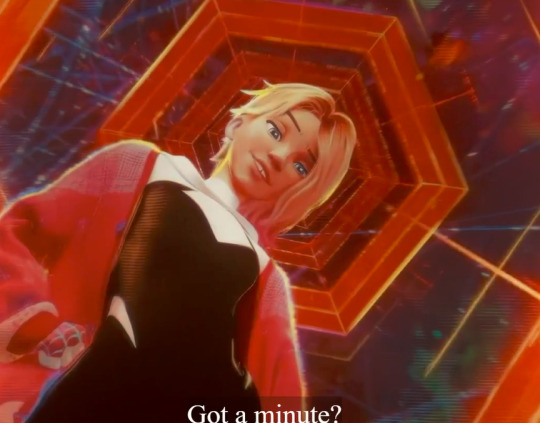
Miles barely had time to recollect himself (a lot more coherent if it was me that's for sure.) But again, I think that is to be expected.
What I like is what Gwen is doing.
The first thing she does is try to appear casual, looking around to anything in the room before him.
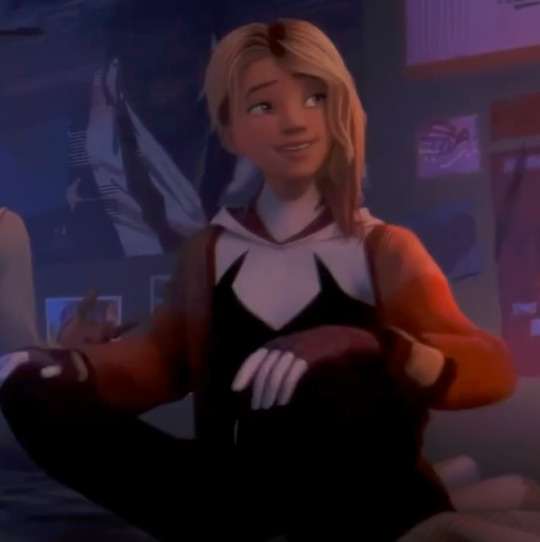
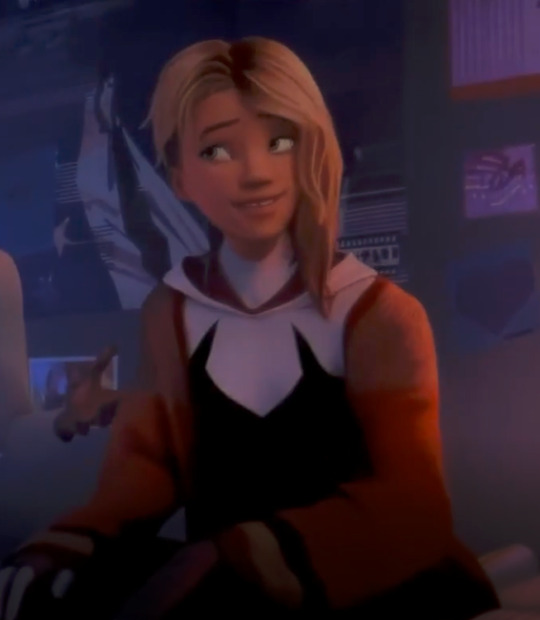
But the second she looks at him (and I mean SECOND, I was trying to get a decent screenshot but is hard.) she hugs him.

(We will take a moment to appreciate Miles being so out of left field he is just frozen.)
I also like to note that Gwen is probably a very physically affectionate person, or at least, someone who likes being physically affectionate with the people important to her.
We can see it with her dad in how even when things with him are tense, she doesn't hesitate to hug him because despite everything, she loves her dad.
And with the spider society being well, the spider society (That's a topic for another day and maybe not this blog,) she probably doesn't have a lot of affection these days, which makes sense go to Miles since well, she REALLY has miss him.
But I don't think she agrees with that.
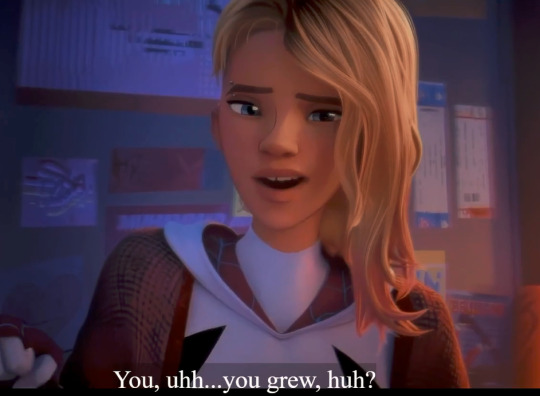

Hey, remember how I was talking about how cool and collected Gwen seems at first, just to be betrayed by her own emotions because she cannot help it? This is happens often and I love it.
I think this is a good time as any as to talk about something that the movie could had done, and I am SO glad that they didn't.
Part of the reason I was lukewarm to this ship in the first movie, is that it was doing partially the very tired trope of "Dorky protagonist has a hopeless crush in the badass female co-lead and despite finding him annoying at first, they end up together."
Luckily it doesn't actually immerse into that trope and Miles has more personality than most of those archetypes; but being a super hero movie, I was kind of tired of this, and while I think Miles crush on Gwen was cute in the first movie, I didn't think they would turn around.
When the teaser dropped, I was afraid it was going to just dive in that route.
And yet, this movie does the interesting thing, by having Gwen actually lose the cool mask sometimes.
Because yes, Gwen is cool, she is awesome. She is badass and she can still, probably defeat Miles if she really wanted to; she has been a spider for longer than him so that makes sense.
However, even if she is all those things, she is still a teen, with a crush, and even her coolness cannot stop the fact that she probably doesn't know how to do this either.
I love how as much as Gwen wants to act cool, she still slips up because she probably thinks she made Miles uncomfortable by hugging him like that (he was just a slow to react, yet that would be my read if I was her.) And also because again, she knows she needs to take it easy.
I found funny how she just realizes this is his room, despite technically she giving it "a look" when she came in. Like I say, she was just trying to contain herself.
Miles being nervous about looking like a kid (valid fear considering one of the last things Gwen said to him was how she was 15 months older than him.) is normal and cute.
While I don't doubt Gwen teased Miles a little, and I still don't know what to say about the ripping scene; she sounds a lot more relaxed about the fact that one may think. I had people react badly to my fandom stuff that is often perceived as childish; so while Gwen still shouldn't had done that, it wasn't bad in my eyes.
Now let's talk about one of the favourite scenes for us shippers.
When she sees the drawings, I think she sounds a tad shocked and confuse, which is normal all things consider. What is important for me is Gwen's reaction.
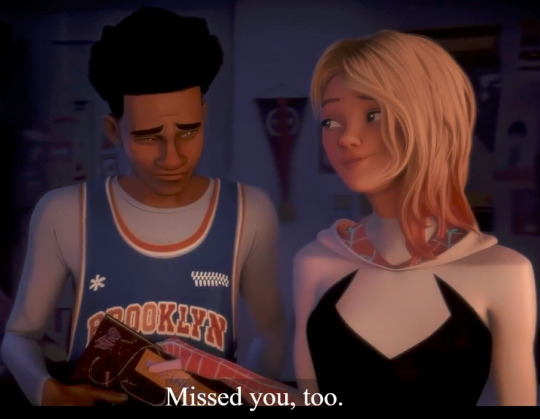
THIS isn't the face of someone uncomfortable with that information.
Listen, I am not trying to shoot my own horn or anything, but when I was younger, I had people confess to me, from private to in a very public manner; and it can be extremely uncomfortable and awkward.
I had needed to find a way to keep my face neutral, and man isn't easy.
But Gwen doesn't look like she is trying to pretend everything is fine, she looks actually fine with this information.
She literally found out her friend has a stupid amount of drawings of her, imagine someone you know and who you don't have interest doing that to you.
There is no way she will be this chirpy about those drawings if she wasn't a bit happy about it.
Which is part of the reason I love this sequence, because Gwen knew Miles's crush on her from before, but it has been over a year, and you don't know how much it can change. So her initial insecurity makes sense.
And it only takes her less than 5 minutes to confirm that nope, he is still head over heels for her.
And I think getting her cool back and how she reels him in her direction show that.
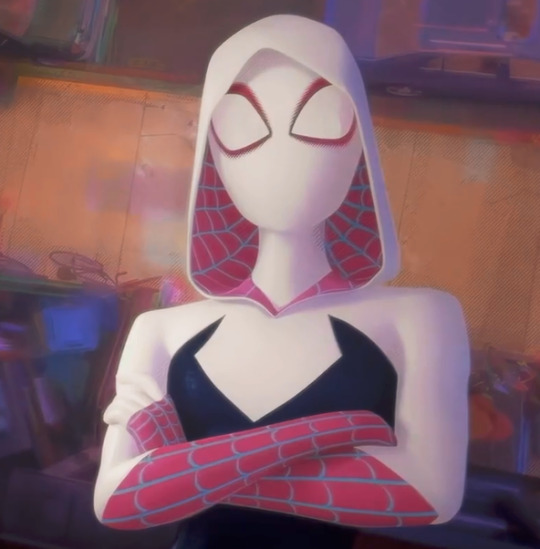
Also, look at this face.
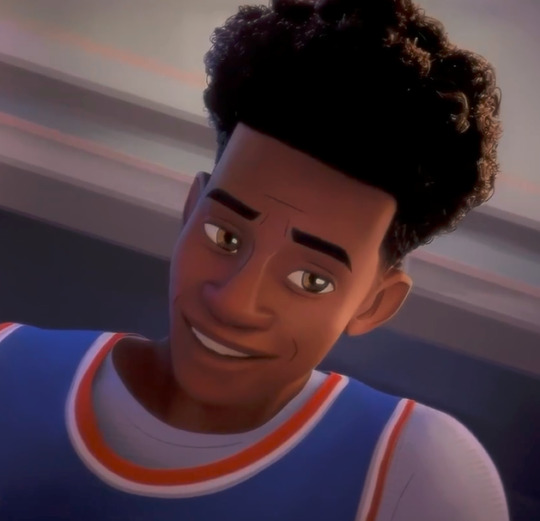
This is exactly why everyone clock's Miles feelings in 0.5 seconds, it never stops shining.
However, as much as his feelings shine through, Gwen doesn't stop showing them back constantly, as discretely as she can.
#ghostflower#gwiles#gwen stacy#miles morales#atsv spoilers#across the spiderverse#across the spiderverse spoilers#atvs#spiderman#spiderwoman#analysis#ghostflower files
295 notes
·
View notes
Text
Personal Halloween Character Design Challenge - Slashertown
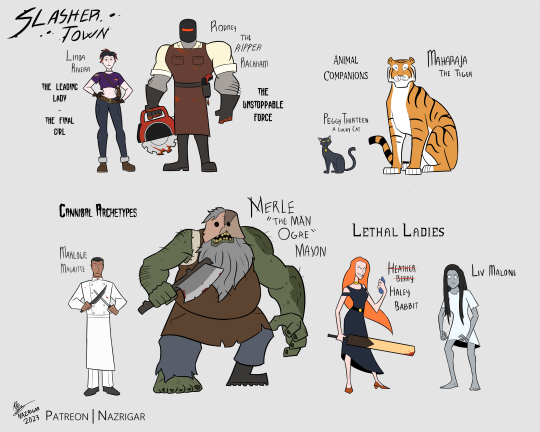
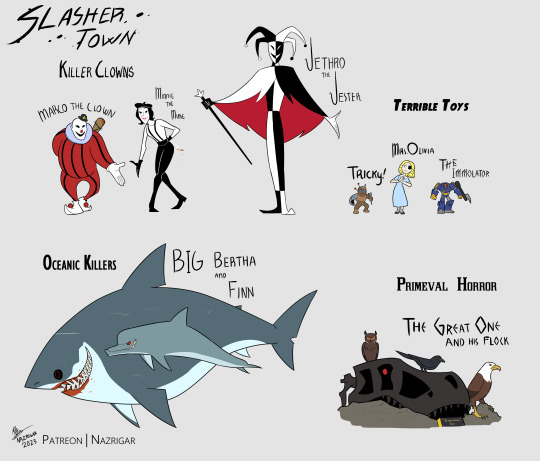
Time to reveal what I've been doing for Halloween/Spooktober!
Basically a personal character design challenge, inspired by my Tiger vs Slasher Villain post!
The gist is that it's set in a town that's basically a magnet for various kinds of horror villain archetypes, ESPECIALLY Slashers... hence its Name.
The Leads: The main protags of the challenge/setting.
Linda Rivera - A young woman of Spanish-American descent, known equally for both her stubborness and her empathy, and a strong, strong survival instinct. She's the been the "Final Girl" for most of her life, be it as a survivor of a literal cult war when she was a kid to Prom night when she was a teen. She cosplays and paints minis for a living, and is genuinely curious about what's REALLY going on in Slashertown.
Rodney "The Ripper" Rackham. Filling in for the unstoppable masked slasher villain ala Jason and Michael Myers, Rodney was once just a humble shop student with an interest in metallurgy and blacksmithing, until one day a trip to the woods went terribly wrong. For years he was the town's most famous slasher, targeting repairshops and others indiscriminately... nowadays he's more famous for another thing -killing other slashers.
Animal Companions: Filling in for the Animal guide/voice of wisdom, ala Coraline
Peggy Thirteen is Linda's cat. A crafty and wiley critter than seems to know just about every nook and cranny in town. Unusually intelligent for a cat, and remarkably obedient when Linda says to "stay put". There's more to her than meets the eye, as shown with her smug face.
Maharaja is the town celebrity Tiger, having been the one to save Linda from a slasher known as "Henry the Hatchet" a few years ago. Unbelievably strong, and much like Peggy, seems to be far more intelligent than what a big cat should be. Linda certainly suspects something.
Cannibal Archetypes: Self explanatory
Marlowe Magritte: Filling in for the Hannibal Lecter side of the cannibal villain, with a dash of Slowik from The Menu, he's the owner of the most famous restaurant in town. His food is to die for, as certain patrons disappeared in his business, just infrequent enough that no one suspects anything. Sure, while having liver with a nice chianti is nice, what he's REALLY after are memories and experiences. THAT to him, is what makes a true experience.
Merle "The Man Ogre" Mason: The Hills have Eyes meets Leatherface, Merle was a man exposed to chemicals during the end of World War 2 and became a mutant... THEN the magics of the town turned him into a cannibalistic monster, lurking about the hills just outside of town. Suprisingly articulate despite his looks!
Lethal Ladies: Because one can never go wrong with more female slasher villains!
Heather Berry lost her mind when she couldn't be Queen of High School Land, and thus took it out on some students, before mysteriously dissapearing after a fight with eternal Final Girl Linda. Now she's back, as Haley Babbit, successful business women with great PR... but beneath the facade, is still the same bloodthirsty Heather!
Liv Malone - SHE FOLLOWS. Slowly. Very slowly. Sure, she's completely unrelenting in her need to dispatch someone, but man oh-man is she SLOW. A simple shove is usually all that's needed to stop her from following you.
Killer Clowns: And this time, they're a family!
Marco the Clown and Minnie the Mime are a brother sister team that only wants to entertain you with their (occasionally lethal) shows! Please laugh at Marco's jokes and take Minnie's Art seriously, they get uspet if you don't!
Jethro the Jester is their grandfather, and leader of the group, simply known as The Troupe. One of the most powerful entities in town, his shows and acts seem to defy physics itself, and he'll always make sure that you leave the show a new person!
Terrible Toys: Three different flavors of violent toy!
Tricky the Ragdoll - Guardian of all children in town, much like Gamera, just one that's VERY open to lethal force when he sees a kid in trouble. Is actually quite helpful to them, no strings (ha!) attatched, offering blankets, food and subtly guiding kids to reunite with their parents if they ever get lost.
Mrs. Olivia - An overpossessive ghost of a woman from the 40s stuck in a porcelain doll. She'll do ANYTHING to protect her "poppets". ANYTHING. She is awoken whenever someone cleans up her toy body.
The Immolator - The most overtly Chucky-like of the bunch, with a dash of Small Soldiers. A psychotic, misanthropic inmate that winded up possessing the toy of a 90s action figure, he'll be more than happy to murder any meatbags in his sights... so long as he has batteries. The REAL danger is that, when dormant, he can imitate ANY voice possible, subtly suggesting you to really, REALLY give him those batteries!
Oceanic Killers: Because you gotta have a Jaws reference!
Big Bertha and Finn are a Great White Shark and Dolphin duo, that work together to un-alive silly and stupid hairless apes. Big Bertha LOVES the taste of humans, and would go out of her way to find 'em, but usually it's Finn that calls the shots. Any human that bothers him or makes fun of him, either gets a taste of his rostrum, or he sends Bertha to do the dirty work.
Primeval Horrors: Because everything's better with dinosaurs!
The Great One and his Flock: Combining both Jurassic Park and Hitchcock's the Birds, the Great One is a colossal, fifteen ton Tyrannosaurus rex, and is the oldest entity in town, and by far one of the most powerful. So powerful, that no slasher dares to enter his territory (which is the Slashertown Museum of Natural History). The birds of Slashertown are his eyes and ears, agents of his will, and those that mess with 'em don't tend to live to see the next sunrise. It's also a foolish thing to lay a hand on his skeleton, as the paleontologists who worship him like a god like to remind visitors. All those that have done so, either disappear (with the only remains being bloodied claw marks) or become skeletons stripped down to the bone.
#spooktober#halloween#slasher villains#horror villains#character design#slashertown#horror#jaws#jurassic park#friday the 13th#coraline#nazrigart#my art#artists on tumblr#character design challenge
119 notes
·
View notes
Text
I'm really tired of the Daemyra stans outrage over Daemon's supposed character assassination (newsflash: he's been abusive since ep1), but I really hate how the writers seem to turn Rhaenyra into a battered woman archetype.
While I don’t think Daemon's physical abuse is particularly out of character, I really don’t like the direction they seem to go, where Rhaenyra (and Alicent) are these poor abused peaceloving women who are just pulled into a violent war by bloodthirsty men.
I don't love the whitewashing complaints about the female characters, but I really hope that not all the bad things TB do end up being Daemon ignoring Rhaenyra's whishes. Robbing the female lead of all her agency in the war SHE is waging for HER throne would be a horrible direction for the show.
#hotd#hotd critical#that's not to say that I don’t think they should explore Daemon's and Rhaenyra's relationship more critically#and acknowledge all the ways it's unhealthy and dangerous for Rhaenyra#but that doesn't mean Rhaenyra should be reduced to a helpless victim#in F&B Rhaenyra was also Daemon's victim but she was still her own character#rheanyra targaryen
41 notes
·
View notes
Note
I see your tags on the Wocky and Alita art, I would love to hear your thoughts on Alita actually!
I only need one person to show interest in what I have to say for me to talk forever and ever, thank you. HAHA Okay, in seriousness, this won't be as thorough/long as the Klavier post because... there really isn't much to her, but I find it extremely interesting how Alita falls into the same category of witnesses as April May and Dahlia without being — and I mean no offence to her when I say this — stunning? Like, with April and Dahlia, there's a very clear mass appeal to them which most people point out. Contrariwise, Alita's appearance is really only commented on by Trucy, and just glancing at her portrait, you can see that, without her slightly outlandish fashion, she's frankly nothing to write home about.
So why am I discussing this? Surely it's a little reductive to analyse female characters beginning with their appearances? Usually, yes, but that's the thing about this category of witnesses: their pretty faces aren't just pretty faces.
For April and Dahlia, their beauty is part of their arsenal. It functions as both their defence and their weapon of choice; they know how to wield it to bring people under their heel. Alita being ordinarily pretty instead of drop-dead gorgeous deprives her of that weapon and leads you to wonder how she became a mafia heiress to begin with. It also parallels her to Mimi Miney in a way that goes beyond the 'murderous nurse who worked for and killed her awful boss' comparison you get on the surface. Presumably, Alita, like Mimi, only got to where she was because she managed to fool the people around her into believing she was less dangerous than she actually is. Mimi did this by feigning stupidity and inviting people to underestimate her. Alita seems to do this by showing them what they want to see.
When she first meets Apollo and Trucy, Alita stays quiet and spends more time listening to them than she does talking. Once she has a hold on who they are, then she slips into her persona, and I find it interesting how she doesn't even attempt to come across as particularly delicate or lovelorn? Instead she goes for the relatively typical role of a distressed, indulgent loved one earnestly entreating Apollo for help. I'm inclined to say she does this because her read on Apollo makes her realise that he'd likely be exasperated or annoyed by such a person; but it's also almost as if she knows she doesn't have the disposition to pull off that frail, damsel-in-distress archetype and has resigned herself to being ordinary. Like how she looks. The next time she has to reapply her persona, Alita's appearing in court, and again she makes subtle adjustments that best suit her situation. The judge is old, so she takes a chance on expressing her dedication as a wife while balancing her dedication as a righteous citizen, which works. But oddly enough, despite her successes, I don't think Alita is actually good? At donning disguises? Everyone I've seen discuss this case has been able to guess almost immediately that she's the culprit, and maybe we're just prepped by past characters like her that have appeared, but I don't think she's even that convincing in the game.
Both the identities she assumes are risky manoeuvres that happen to fall in her favour, and she's not particularly dedicated to maintaining the front. When she asks Apollo to be Wocky's defence, she admits that marrying him is largely a chance at a more exciting life than some great love story; Plum Kitaki straight up says that there's a darkness in Alita she doesn't like, despite how docile Alita behaves in front of her; and Wocky has moments where he slips up and calls her things like, "imposter" and "fallen angel", implying that at least subconsciously, he knows she's not what she makes herself out to be. Even her general mannerisms don't greatly differ between her actual self and the mask who's blunt her claws — nothing is ever overtly coy or cutesy — and when Apollo brings up the fact she was Wocky's nurse, she drops the facade almost immediately. There's no waffling, no, "Whatever do you mean?"s or, "You're scaring me"s, just the statement, "I don't know what you mean by 'meaning', Mr. Justice!" delivered in a sudden cool, frosted steeliness.
And I think that steel is what really makes her different.
See, the other women are all driven to crime by some defining trait in themselves caused by their circumstances. For Dahlia, it's her desperate need to be free of the Fey clan; for Mimi, it's grief over her sister's unjust death; and for April, it's her fear of Redd White. You don't really get that with Alita. Instead of there being something dark in her life that leads her down this path, she just seems... tired. Tired of being "pretty enough" but not "gorgeous", tired of being the obedient nurse to the corrupt doctor, tired of being ordinary. There's no predatory external force pushing her into a corner, there's no abusive family beliefs pinning her down. There's just an ordinary life, lived dull and ordinarily, and she had had enough. So what does this girl, who's tired and ordinary in every way except the steel that lines her spine, do to get out of this?
She gambles.
Marrying into the mafia was a gamble, seeking Apollo as council was a gamble, shooting Dr. Meraktis was a gamble. Every decision she's made since she met Wocky has been a series of high-stakes gambles that leave her life on the line all so she won't be second-best anymore. This time, she was going to be the one on top. No matter what.
... And I'm sorry for loving evil women, but girlboss?? Girlboss???
I've heard people say they're disappointed that her "breakdown" is just an extension of her usual damage sprite, but it's honestly one of my favourite "breakdowns" in the series ever? Just because it isn't really one? Everything Alita has done up till now has been reckless, calculated risk, of course being convicted for murder is no different than losing in any other aspect of her life. Of course you're not going to get more than her damaged sprite, because this doesn't warrant a more dramatic reaction. She's lived this whole time knowing it could all come crashing down around her, and it finally did.
She made a bad bet. You caught her. Oh well.
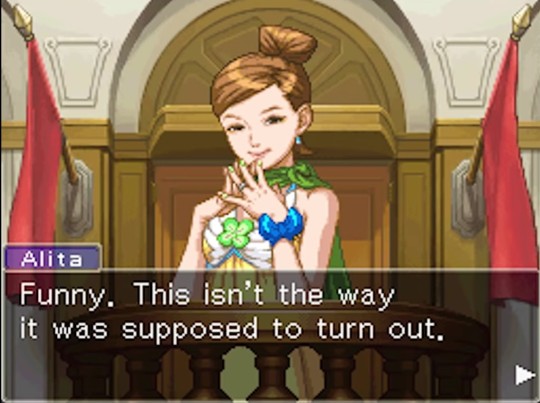
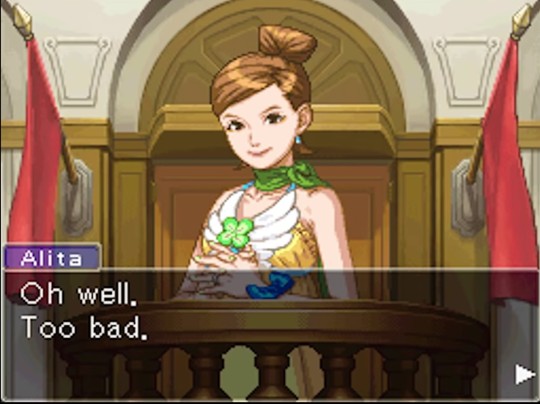
The frosted girl of steel, standing tall to the very end. It's kind of sad that, even after all that, she's still seen as only second-best, incomparable to mimi, dahlia or any of the other women who've stood in her place.
#alita tiala#ace attorney apollo justice#my inability to shut up has made me liar again 😔 it's not thorough but it is long.#i know it's weird that me saying she's more than what she seems is essentially me pointing out how flat she is compared to everyone else#(no tragic backstory or deeper hidden motive)#but i cant help it!! i think the evilness is sexy!!! like people love to make dahlia out as this heartless bitch but she's really not.#she's traumatised and lashing out. but alita? alita with her nerves of steel boredom with her ordinary life and raw selfishness pushing her#to take more and more and more??? alita is your girl for that. im sorry for loving evil women but god. she makes me so giddy. the lengths#she's willing to go to just to stand above everyone for once in her life is so... god!!!!!! im sorry. she makes my heart flutter.#kristoph wishes he had half her resolve and idgaf attitude#asks for the notebook#thank you for the ask omg. i forgot to say that. it was so much fun to answer and i hope you got something out of it 💗♥️💖💘💓💞💕💝💓💗💖
41 notes
·
View notes
Text
The Archetypes of Red Rose, White Rose
I need to balance my brain out due to sudden onset of depression. It is the result. Rommel is probably the only general who, even if you draw him from the back, he's still recognizable- flowers, a camera, and love for beauty. Rommel has a Venus-Mercury conjunct with a direct Neptune influence; he is going to appreciate artistic expressions.
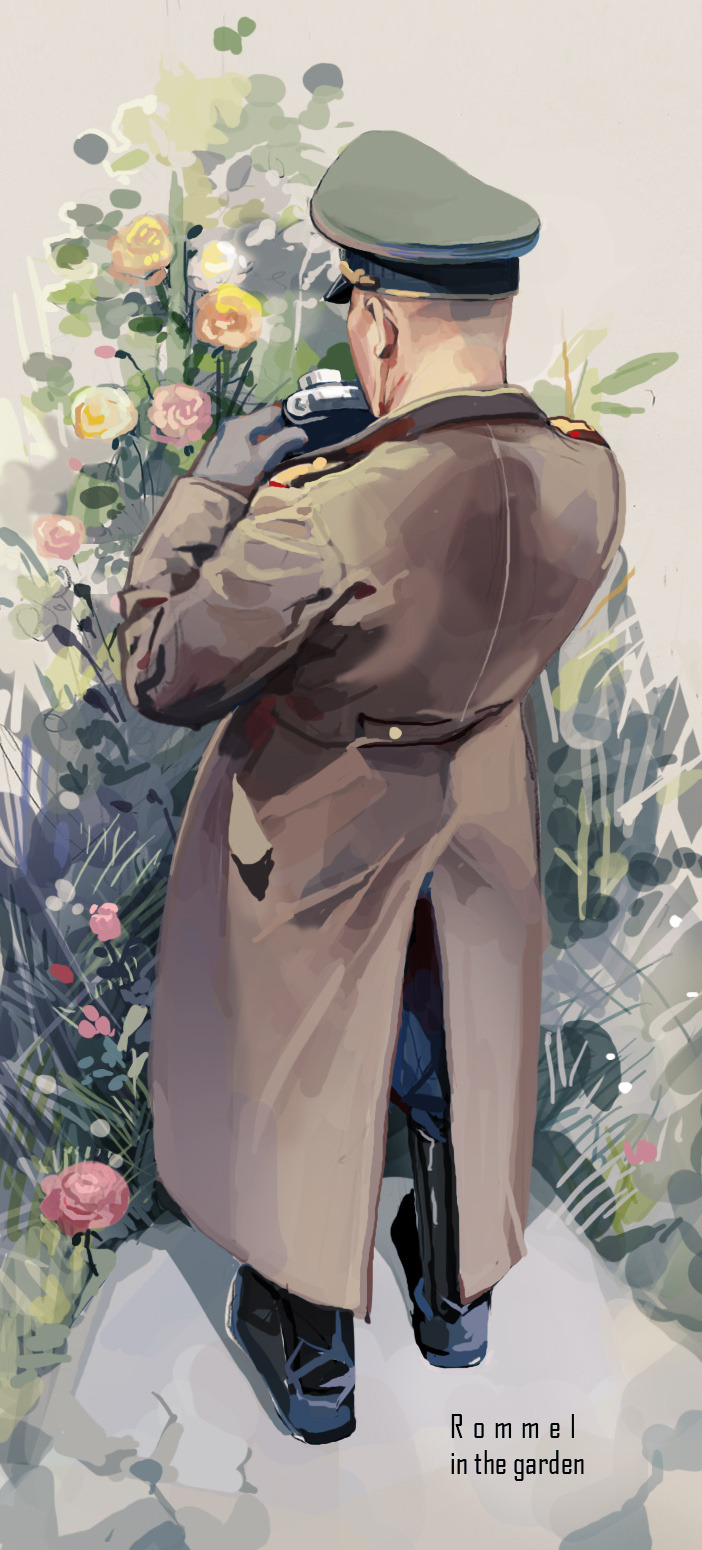

In fact, this colored-doodle with an unintentional Mucha vibe has the energy of his wife Lucy in mind. According to some sources, Rommel wrote home to Lucy daily, as it was reported to be his mental crutch- I imagine it to be transcendental emotional support, not unlike my own experience, my own relationship with our Tumblr community here. Whether you guys interact with me directly or not, you keep me alive. My sincere thanks to you.
Lucy was a formal dancer in Danzig with a decent middle-class background, her father seemed to be a land owner- Lucy being able to do art, probably added to his admiration for her- fellow artists, angelic companionship.
I suppose he did need emotional supports, and a lot of it-- Rommel is the only high commander with whom Kessering "the smiling Albert" did not get along-- which is a feat. After all, Kessering was very renowned for his exceedingly cordial and diplomatic temperament. The same could be said of von Rundstedt, the calm, gentlemanly, old Prussian field marshal. These two could put up with some bad BS from any one else, except Rommel. He was too intense, too mentally off-balance, too difficult to deal with for his colleagues.

There are a few things I noticed from Rommel's biography (including the Trail of the Fox, 2005), that allow me to make some observations. His love for Lucy appears to be non-sexual. They had their only son 12 years after marriage. That is a pretty long time, not customary with a Scorpio man who has a 8th house Mars (who is supposed to have at least above average sex drive).
As a matter of fact, Rommel had a daughter with Walburga Stemmer before his marriage with Lucy was finalized. At that point Rommel’s family felt the need to step in and strong-armed him back with his fiancée-- one reason being to prevent the young lieutenant from the pitfalls of sex and alcohol. In my humble opinion, the subtext here might be Lucy would not lead him astray in that regard, therefore his conservative family would rather have him marrying Lucy.
A side note, Stemmer family still holds a collection of hopelessly romantic letters from Rommel. Did Rommel write comparable letters to Lucy at that point in time? A bit hard to tell.

I could not recall which article comments that Rommel was "hen-pecked' in the household, but Lucy was dominant at home, that part had been very true.
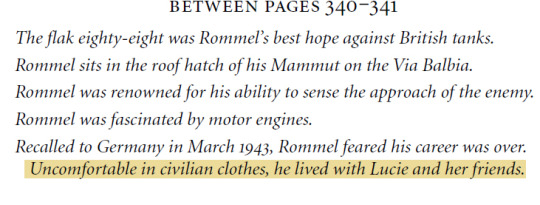
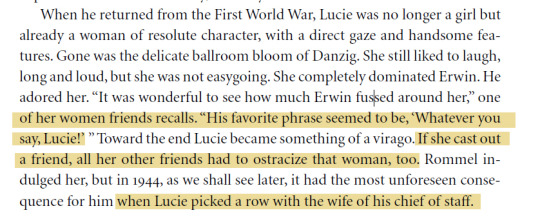
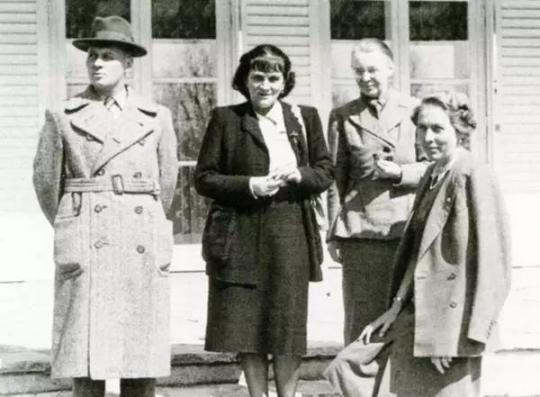
Ouch, I don't know, some aspects of this living environment must've been toxic to Rommel no matter how much some folks wants to romanticize it. It is horrible to be in a friend group where there's a mean girl boss who takes pride in ruling over her husband and turning any girl who crosses her into a persona-non-grata. But I digress. Back to my title.
Nevertheless, for me, Lucy being archetypal White Rose still holds water as a concept.
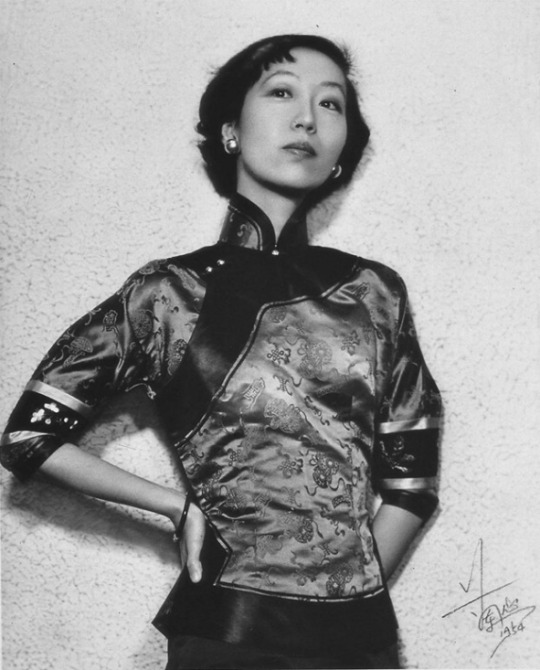
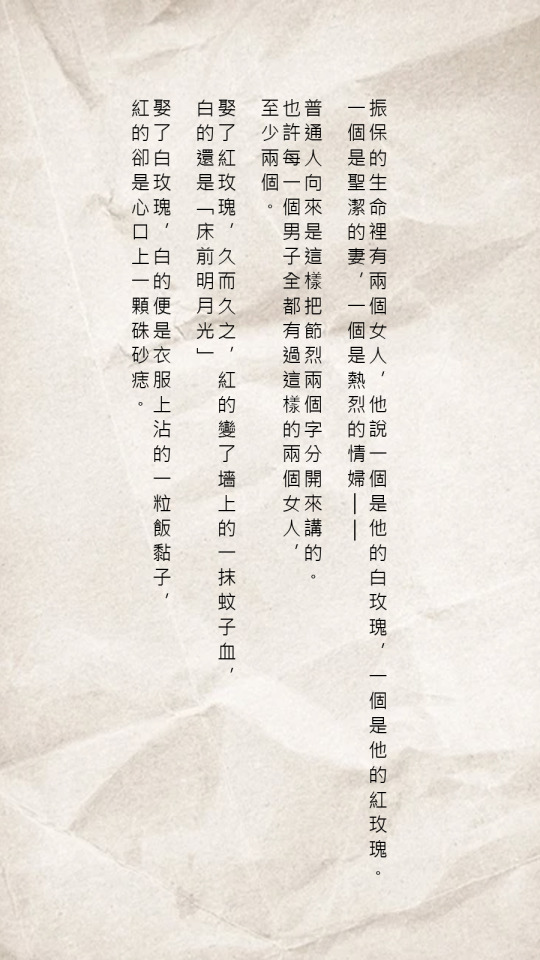
The Red Rose- White Rose archetypes originated from the same-titled short novel by Zhang Ailing, one of the 20th century's greatest female writers. She depicts love's tragedies as Chin dynasty fell apart and China marched into an era of post-colonialism, world war II, civil wars and partisan conflicts-- and eventually, modernity.
White rose is your ideal wife, the guardian of your family's social standing. She is angelic, she seems docile, she reminds you that you are from a place of honor and integrity, not of seedy backgrounds and carnal desires. White rose kills love by loving you, by being stable, by calming you down whenever you freak out. Very slowly, she castrates you, she brings you home to domesticate you.
The Red Rose symbolizes those dark desires, a black hole that sucks you in to have sex with you, a fragrant bed, a sex dungeon you do not have the will power to claw yourself out of. Red rose loves you by conquering you, destroying you and everything you represent and cherish with triumphant strides. Very quickly Red rose tears you down, burns all your bridges, until you are beyond recognition, until you are flesh, blood, fire and desire, a literal mess.

It is implied in Ailing's novel that men invariably choose the White Rose, because they are human, all too human. Marrying her, he regrets it; not marrying her, he regrets it even more. Such is love's tragedy in the face of humanity, and tragedy is the only inevitability in Ailing's universe. That's why I pull Lucy in as a faint through-line in my Montgomery x Rommel fanfics... not that I am going to write any more, I don't think so.
And yes, Red Rose is synonymous with Bernard Montgomery, in my fandom brain's humble opinion.
I know I am weird.
48 notes
·
View notes
Note
I would love to hear more mike wheeler - Steve Harrington masculinity thoughts (also whatever happened to Hopper to make him action guy my beloathed)! Also will we get a mike chapter for and they were married?
Okay yes! I am fascinated by Mike and Steve as narrative contrasts, and I always find myself looking for fic where the two of them meaningfully interact, and I keep meaning to write about them.
(Also: Mike deserves his own chapter of that fic, but he's getting folded into Dustin's. What Mike really deserves is his own fic that takes place in that universe, because I know what his deal is there and it's a doozy, but that is a very different post.)
Anyway! For starters, I don't think that Steve and Mike are intentionally meant to be foils. There's an element of it in the first season, where Steve exists to support Nancy's character, and Nancy and Mike are meant to be foils -- Steve is the Popular Kid, the antithesis of Mike and his friends' little group of nerds, he and Tommy and Carol are written into the same category as Troy but older and less actively murderous, and the fact that Nancy's dating him says things about her -- but they end up occupying oddly similar spaces and cool parallels come out of that anyway.
A core thing about it is that Steve and Mike are both the guy in their respective age group casts on the show. The Guy. The central one, the normal one, the presumed-to-be-straight one -- and yes, this is fandom and we have Opinions about that, but the Duffer brothers think they're both straight, and that matters here. They're white, they're able-bodied, they have money. They are, in a sense, normal.
Narratively, they very often act as central/POV character for scenes they're in, at least once Steve gets past the fistfight in S1 and awakens to the fact that he's a person who can make decisions. And that makes sense, because being The Guy also means they're the closest to the classic TV protagonist archetype, the guy who does the hero shit and gets the girl in the end. Hopper is also The Guy, and always has been: in S1 it's just him and Joyce, but even as we add more adults, the only real challenge to his The Guy status is Bob (which is of course why Bob had to die). Murray is a bizarre conspiracy nut, and queer-coded besides that. Owens is an affable bad guy. Alexei and Dmitri and Yuri are all Russian.
Being The Guy comes with a certain amount of baggage. All three of them have to be romantic leads, and have to be crossed in love about it. All three of them are protectors in one way or another. And all three of them are on occasion assholes who have one hell of a time with sincerity and affection.
And this is where we get into Toxic Masculinity, because again, while I don't think the Duffers intended a pile of parallels between these three guys, well. Firstly, The Guy as an archetype is built on a pile of toxic masculine stereotypes, so that's often there to begin with. Secondly, it's the same writers, so certain themes rhyme whether they're intended to or not.
In particular, one of the core tenets of toxic masculinity, not just in ST but as a thing in the world, is when and where it's acceptable to experience soft emotions of affection, care, and vulnerability. The first rule of toxic masculinity is don't. The second rule, the caveat rule, is a little asterisk saying 'except, occasionally, with a female romantic partner, if you absolutely must.'
And so we actually see a lot of unfolding of this in Steve! One thing we know about Steve, without precisely being told, is that he's deeply lonely -- for a popular kid he sure seems to only have two Actual Friends when the show starts and they hardly seem to even like each other. He has a new Favorite Person every season, and he clings to them with the joy of a devoted golden retriever. His mental image of happily-ever-after is a house full of kids with enough siblings to never get lonely, family vacations about close quarters and spending time together. We never see his parents. For all a lot of the 'horrible abuse' fanon is very much fanon, Steve is inarguably a lonely kid. And where do we see him reaching out for affection?
It's not Tommy and Carol, although until they break up he's constantly in their company unless he's alone with Nancy. They hardly even seem to like each other very much, and yet they've stayed at his empty house enough for Tommy to know about his mother's fireplace and Steve to insist he do laundry while he's here. No, the person who Steve is allowed to feel things with and for is Nancy, because she's the caveat, she's the exception. This is why Steve is consistently focused on getting Nancy back, getting a new girlfriend, getting a date. That's the rule!!!
The really fabulous thing about Steve's arc across the first three seasons, and even into S4, is that this quest for romantic affection and vulnerability is both thwarted and rewarded again and again. He tries to apologize to Nancy, to win her back: by the time he sees her again, Nancy's got a new boyfriend, but Steve has a new brother. Dustin is Steve's favorite person by the start of S3; he gets Steve's haircare secrets, he gets Steve's loyalty, he gets Steve's joy. In S3, Steve tries to pour his whole heart into a different girlfriend, and Robin turns him down flat while also simultaneously opening herself up with such vulnerability that they instantly become best friends. Robin is S4's Favorite Person, but the great thing about these relationships being platonic is that Steve gets to have more than one! He gets to have both Dustin and Robin in his life! He gets the other kids as part of the package! Bit by bit, instead of a girlfriend who Steve is "allowed" to be soft with, Steve gains actual friends who he gets to be real with whether it's allowed or not.
And the really tragic thing about Mike Wheeler is that he's doing the opposite. Mike starts out with three friends, three best friends, absolutely devoted to one another. As kids, they're young enough to be free of most of the stranglehold of toxic masculinity yet, although of course it's starting. And then there's El.
Mike charts a really interesting course over four seasons, and the shape of it is not a straight trajectory from 'Mike adores and is BFF with Will' to 'Mike thinks only about El.' Hell, from what we see of S1, the Party are all best friends pretty equally before Will goes missing -- Lucas is the one ready to break into a government lab for him, not Mike. Mike's trajectory is far more 'I derive the bulk of my personal self-worth from protecting other people, and as soon as somebody needs to be saved I go fully into Paladin Mode, making me feel worthwhile and important." It just so happens that the two people in Mike's field of vision who most generally need protection and saving are Will and El. Which leads to Mike's intense Will-focused devotion in S2 (El is gone but Will is also in really significant need, and Mike just straight-up activates, jumping immediately into solicitously taking care of his friend because Something Needs Doing And I Can Do It). And Mike's intense El-focused devotion in S4, where El needs a literal quest to come and rescue her. And just a lot of Mike in general.
The problem with all of that is the part where, unlike Steve who keeps forging new platonic relationships, Mike keeps neglecting his more and more. The S3 Will fight is so good at illustrating that, because look -- we all know Will has a crush on Mike, but at no point during that fight does Will ask, even subtextually, for romantic attention. He's asking for platonic attention, which Mike is absolutely failing to give. "Where's Dustin right now? You don't know, and you don't even care." But as Mike says, they're not kids any more -- and this is how growing up is supposed to work!
(Note: I don't want to say that it's toxic for Mike to be in love with El, or really caught up in that relationship -- he's fourteen! she's his first girlfriend! he thought she was dead! But Mike's an asshole in S3 because he's caught up enough to not notice his friend's feelings until they explode at him, and yeah, I do think part of that is because he knows he's Not Supposed To.)
S4 is a lot, because here's where we're really seeing the culmination of a lot of what Mike's been unfortunately moving towards. We've hit a point where those vulnerable feelings that Mike's allowed to share, at most, with his girlfriend, feel like too much to even share with his girlfriend. He can't say 'I love you'. He can't even talk to Will. The conversation he does have with Will is honestly mostly about Mike and his feelings of inadequacy, of not measuring up, not being special, but it has to be couched in the context of El. If there's a reverse-Bechdel test to be done on S4, past the very first episode I'm pretty sure Mike fails it -- I don't think he has a single conversation that isn't about his girlfriend in one capacity or another.
In contrast, S4 Steve is, yes, pretty focused on girls-in-general and Nancy-in-specific, and yeah, there's a little bit of backsliding going on there. But he's also having conversations with Robin about her fears and longings, having weird little interludes where Eddie's the one bringing up Nancy rather than Steve himself. He's hurt at the end when Nancy is clearly still with Jonathan, but he's able to move on, to go fold clothes and care about Robin's love life instead of his own -- his optimistic happy ending in S4 is that his best friend is going to get the girl, not him.
I think there's a lot more to say, which I only brushed on briefly here, about other aspects of Mike and Steve that work in parallel or contrast -- their protector thing, which feels very intrinsic but shows up very differently in both of them, the way Steve says 'I love you' so easily and Mike has trouble saying it at all, the way they are both very much extremely normal guys, at least on paper. There's so much to say. I think that has to be a different post.
I will say, in terms of Hopper: Jim Hopper is what it looks like when those pent-up feelings that you aren't allowed to express to anybody other than a romantic partner sit and fester for decades. Fuck, there were things about Vietnam he didn't even tell his wife, that sat like poison both emotional and biological between them. When we meet him in S1, he's processing grief with drugs and drinking and processing fear with rage. He has spent so much of the past four seasons processing fear as rage.
Of course Joyce is the one person he's allowed to, sometimes, on occasion, be soft with. Of course nearly his every interaction with Mike is macho dominance posturing. Of course the entire trajectory of his relationship with El is a push-pull of Hopper retreating into authoritarianism and anger instead of the terror of honesty, and then getting to see the consequences of that when his daughter pulls away. Every season has broken him down a little more that way, but then the yo-yo pulls back (Season 3 whyyyyyyyyy). By Season 4, he's been beaten and starved and frozen and shattered enough that we get maybe the most honest monologue of his life, to a Russian prison guard, because they're about to die so what do the rules matter any more. It's a clear window into an endless pit of self-loathing, because for twenty or thirty years Hopper's been letting those feelings eat in instead of out, and bit by bit they've been devouring him.
El is hope, for him, and Joyce is hope, and the cracks that broke open in Kamchatka to maybe let in a little more air that might not seal right back up again are hope. But it's hard. It's hard! It makes him an absolute asshole, including and especially towards the people he wants most to protect. (And there's that protector thing again.)
Anyway, I am on the record as liking Steve a lot and having very little patience for Mike and Hopper, but like. They're not that different, at their core. They just put the pieces together in a different order.
#stranger things#driveby meta attack#asked and answered#shit this is really making me want to write those D&D class breakdowns I keep promising#maybe I'll get to one or two of those this weekend#mike wheeler#steve harrington#jim hopper#at least a bit
84 notes
·
View notes
Note
Hey! so what did you think about Claire on the bear? I've seen some people call her a mary sue, a mpdg, a pick me which feels a bit much to me lol. I generally agree w people who say that she wasn't fleshed out and felt out of place bc of how carmy viewed her. My only thing is she never felt like an ER Doctor. Her career was supposed to be equally demanding so it should've affected their relationship in some small way at least but she kinda just seemed available for him at any given moment.
One of them I can see an argument for, the other two no. So before I get into the one I can see an argument for, I really need people to understand that these terms actually mean something. They're not blanket descriptors for female characters who annoy you and while we're at it, just for initiumseries, I'm going to add for the record that there aren't male versions of pick mes and manic pixie dream girls because these stock characters (or in the case of a pick me, viewpoints,) are rooted in misogyny
A Pick Me is specific
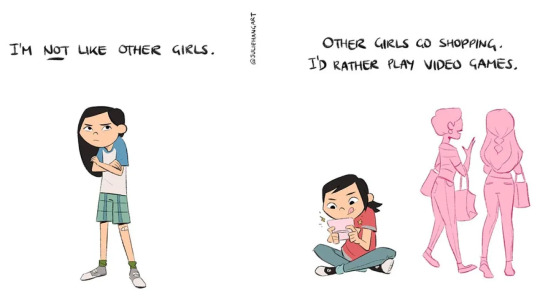
A Mary Sue is specific
Mary Sue stories—the adventures of the youngest and smartest ever person to graduate from the academy and ever get a commission at such a tender age. Usually characterized by unprecedented skill in everything from art to zoology, including karate and arm-wrestling [...] She saves the day by her wit and ability, and, if we are lucky, has the good grace to die at the end [...]
Like even Nathan Rabin who coined the term MPDG apologized for doing so because it keeps being misused:
I feel deeply weird, if not downright ashamed, at having created a cliché that has been trotted out again and again in an infinite Internet feedback loop. I understand how someone could read the A.V. Club list of Manic Pixie Dream Girls and be offended by the assertion that a character they deeply love and have an enduring affection for, whether it’s Diane Keaton’s Annie Hall or Katharine Hepburn in “Bringing Up Baby,” is nothing more than a representation of a sexist trope or some sad dude’s regressive fantasy.
It doesn't make sense that a character as nuanced and unforgettable as Annie Hall could exist solely to cheer up Alvy Singer. As Kazan has noted, Allen based a lot of Annie Hall on Diane Keaton, who, as far as I know, is a real person and not a ridiculous male fantasy.
From what I can recall, nothing about Claire is "Pick-Meish" or "Mary Sueish", she explains that when they were kids and a girl broke her arm, everyone was freaked out except for her because she wanted to understand the injury, that is not Pick Me-ish.
This is Claire
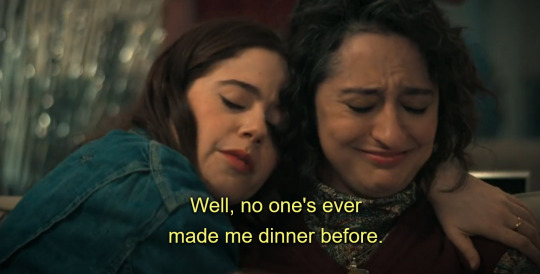
not this
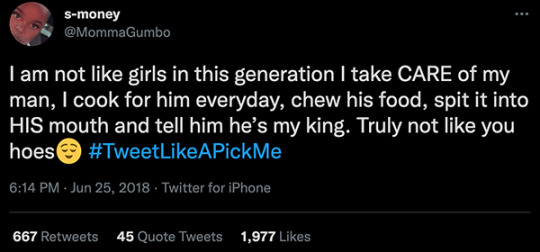
The fact that she has six months left on her residency doesn't make her a Mary Sue.
Now with regards to being an MPDG, these are the characteristics of one:
That day in 2007, I remember watching "Elizabethtown" and being distracted by the preposterousness of its heroine, Claire. Dunst's psychotically bubbly stewardess seemed to belong in some magical, otherworldly realm -- hence the "pixie" -- offering up her phone number to strangers and drawing whimsical maps to help her man find his way. And as Dunst cavorted across the screen, I thought also of Natalie Portman in "Garden State," a similarly carefree nymphet who is the accessory to Zach Braff's character development. It's an archetype, I realized, that taps into a particular male fantasy: of being saved from depression and ennui by a fantasy woman who sweeps in like a glittery breeze to save you from yourself, then disappears once her work is done.
She isn't quite the "pixie" part of the trope, I don't think she's whimsical enough for that, instead I would say she's the "insufferable female lead in an indie" trope (love this!)
instagram
because she does kind of just appear or sweep in to Carmy's life and has this history with him
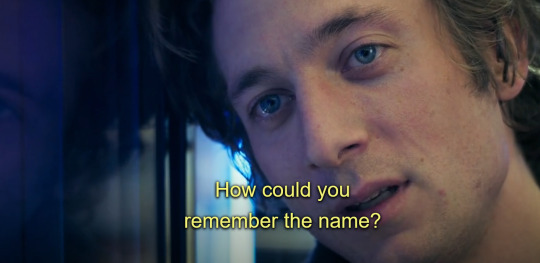
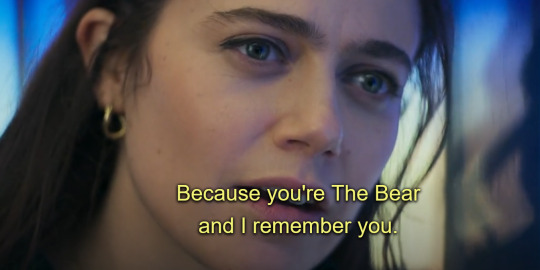
and instead of giving Carmy her number, she asks for his, therefore the narrative places the onus of initial pursuit on her
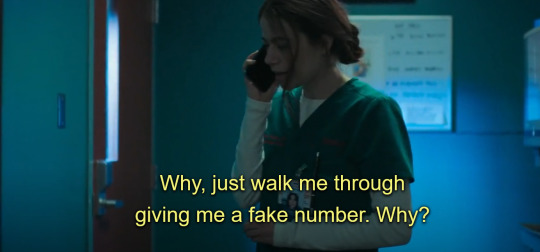
she's been carrying this torch for him since they were kids
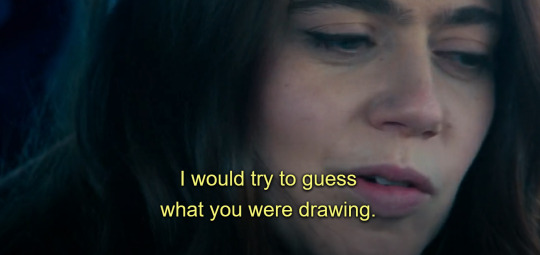
and her role is to be someone in his life that makes him feel good, that takes his feelings into consideration,
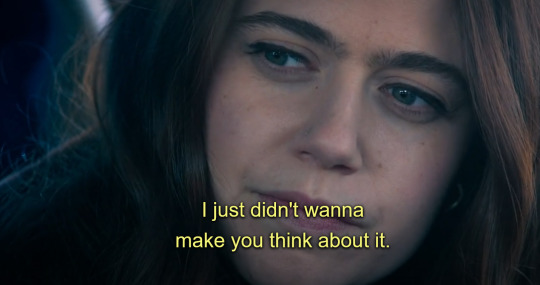
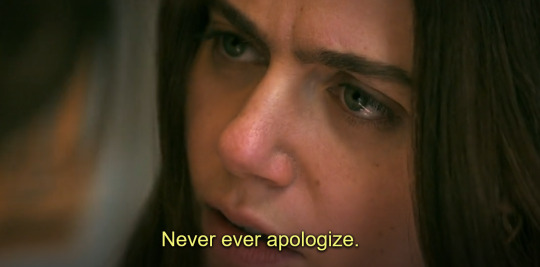
that gives him peace
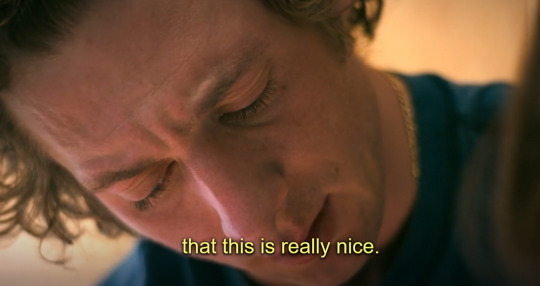
that urges him out of his shell
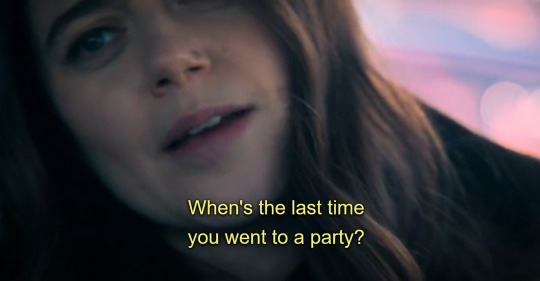
that shows him another way he can be and feel outside of the restaurant
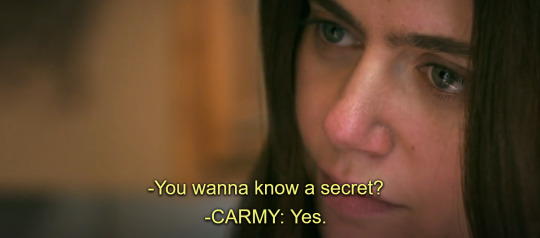
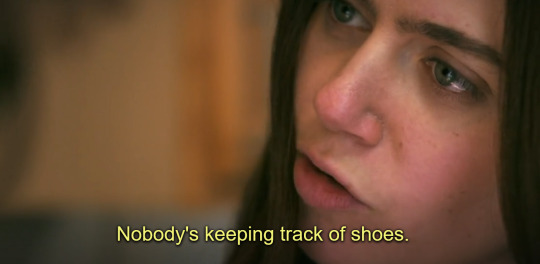
while we basically know nothing about her outside of that role.
What makes this iteration more complex than others is not Claire, it's not that she's a fully fleshed out character and we see more than a glimpse of her life and it's not that we get to know about her personally because we don't really, what we get is this
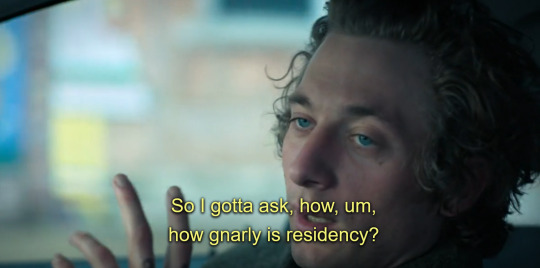
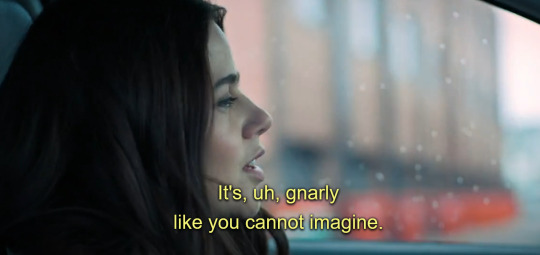
which just goes back round to Carmy and his complicated relationship with food and cooking anyway
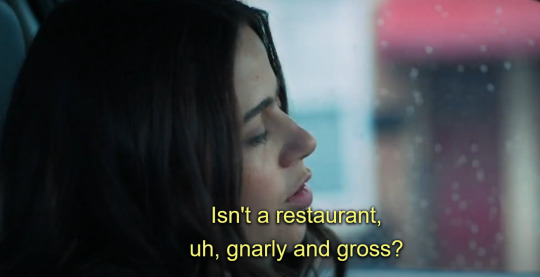
the subversion lies with Carmy and how he needs to heal and still has a lot of unprocessed trauma that doesn't go away because Claire entered his life, the show shits all over the typical outcome of the MPDG coming into the male protagonist's life and making it all better.
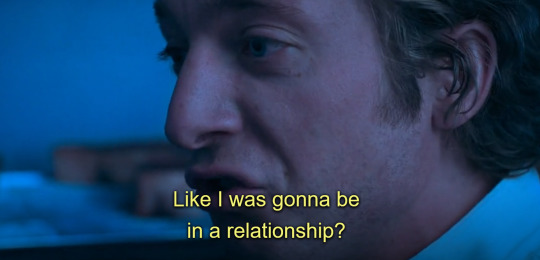
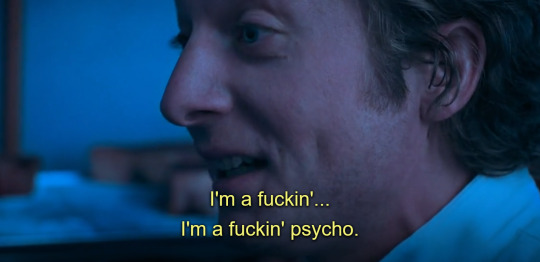
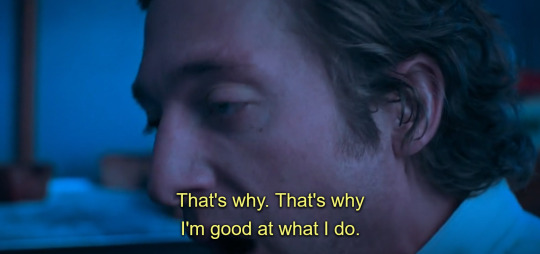
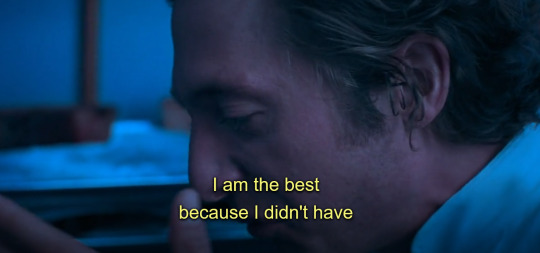
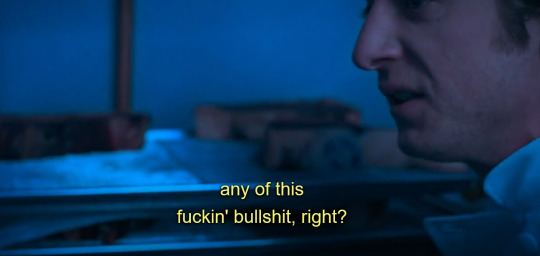
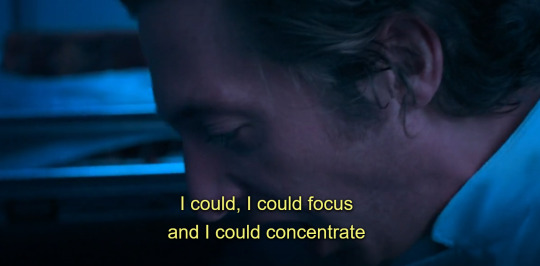
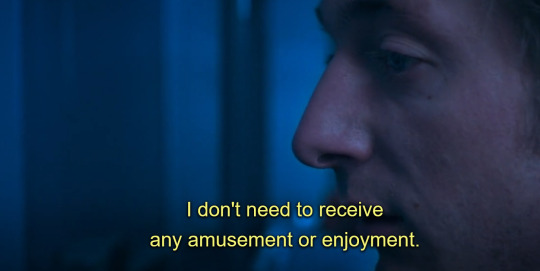
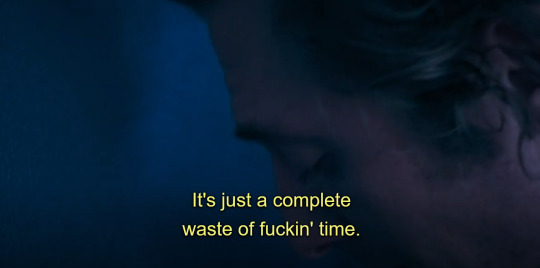
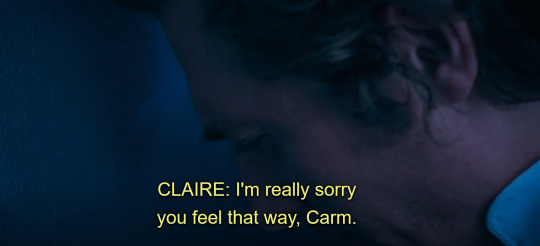
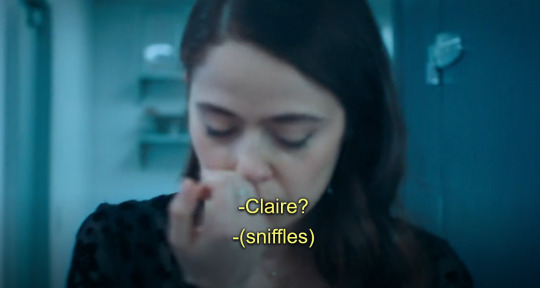
I'm not saying that they did that purposefully as in they're trying to say something about MPDG, like I don't think the show purposefully framed her as one or views her as one, I think they just wanted to show how deep-rooted generational trauma is and how it presents itself and how it affects your current relationships and it ended up being subverting an MPDG-esque trope for the male protagonist.
I don't know if any of this makes sense, I haven't slept and it's like 5 AM lmao.
62 notes
·
View notes
Text
This represents my personal perspective on the matter, so please don't interpret it as a factual statement. It's an opinion, and there may be exceptions if you explore thoroughly. However, I find the otome isekai genre quite monotonous. The recurring theme of recycling concepts, reusing character designs with a prevalent "same face syndrome," and the prevalence of protagonists resembling each other, particularly the Duke of the North archetype with that clichéd Idol haircut, contribute to a sense of staleness. The majority of flawless female leads with 99% being blonde, with a few exceptions, adds to the predictability.
For me, the transmigration or reincarnation concept caught my attention around 2018, starting with works like "Who Made Me a Princess" and the infamous "They Say I Was Born a King's Daughter," even though I admit my taste was not the best back then.
The idea of taking over someone's body and living their life fascinated me. What made it unique was the perspective shift, allowing us to see many previously despised villains from other stories in a new light, experiencing the narrative from their point of view.
But, this is when it started getting old real quick. My god, how many fucking times am I going to see a good heroine turned evil and the villainous be taking the leftover men from the heroine side and forming a harem. The villainous unfortunately can't be nuanced because all these stories do is just make shit black and white. Our MC can't be held accountable for what they did but sob hard enough and we get an ally to ride behind her.
You know what's incredibly frustrating? These Korean women from the 21st century keep transmigrating into these villainous roles, and it's just downright irritating. They either come off as overly naive or stick to the tired narrative of being an office worker who suddenly becomes wealthy and tramples over others. It lacks uniqueness, and seriously, what do we really know about the female lead (FL) beyond the prologue? Who is she? What's her home life like? Does she want to return? These are questions I want answers to, but we're not given the chance because the focus remains on the villainous character. Even that aspect isn't executed well; they end up softening her character and making her more compliant than she was in the original story just to avoid a bad ending. I'm more intrigued by understanding the backstory of the actual original villainous character.
The male lead (ML) seriously disappoints. I get it, this genre revolves around romance, but let's get real for a moment—do we genuinely care about this so-called "romance"? What truly matters is the chemistry between characters that makes us feel, cry, and get infuriated, and that's what a story should evoke. Worse than a bad boy ML is a downright boring male lead. Whether it's the Duke of the North or any other generic character, they all feel like mere props catering to the female lead, and that's painfully dull.
I couldn't care less because these MLs exist solely to assist her in everything, whether it's for revenge, to play the savior, or to be the healer. Nothing feels genuine; there's no emotional investment in the romance for me. I'm not overjoyed by the idea of them being together. Many readers seem more fixated on their aesthetics and how well he serves her, but let's be honest—their designs are unimaginative, resembling countless other MLs and MCs. Frankly, I wish more effort were put into creating distinct and captivating characters.
No matter how much one might criticize the toxicity of old-school Shojou romances and the portrayal of male leads, I absolutely loved it. Sure, the romance might not be ideal, but that's precisely what makes it fun and enjoyable to read. The characters have their quirks and distinct personalities, creating their own unique dynamics that add to the charm of the story unlike the former.
Transmigration/Reincarnation is so barley touched in a genre surrounding that very concept. It's like they dip into a puddle but don't expand on the horrors or intrigue of anything really and they be explaining everything from the prologue instead of letting us breathe. We don't settle or sit with the characters and writers are far more interested in miscommunication. It's why I like manga because you get beautiful scenes of just peace or character introspection than you would in colored format.
If there's one story that truly captivated me and made me fall in love with this particular brand of Otome Isekai, it's "A Stepmother's Märchen." It may not be a masterpiece, but the deliberate and slow-paced narrative, reminiscent of a novel, along with the meticulous attention to depicting a semi-realistic high society, drew me in. The story offers complex and conflicted characters, and the stunning art, which interestingly mirrors European illustration outside of the main cast, adds to its appeal. Of course, it's not without its flaws, but the beauty of the narrative has made it stand out to me even years later. It's not a one-note copy it did it own thing that I wish OI did more.
Kill the Villanous,
Death is the ending the villanous
I appreciate how these stories took the isekai concept and added their unique twists. It's refreshing, and I wish more writers would follow suit. While I understand that Otome Isekai is primarily about wish fulfillment, I also crave narratives that offer more than just that. A well-crafted story with thoughtful character development would be a welcome addition to the genre because it sticks out to me more. I don't remember OI titles but for me to remember those is because the concept were different from the usual OH no I woke up in the villain body.
22 notes
·
View notes
Note
yeah, I love BATB, 'true' ETL, but a common problem I run into is that the female protagonist just isn't interesting. I think it's partly because she's the shining face of purity in the face of ostensible evil and that evil gets complexity she doesn't, probably part self-insert, probably also partly because writing 'complex' or interesting female characters is difficult enough as it is (and difficult enough when dealing with the reception of them, which can lead to sanding off the edges).
And generally writing interesting characters is hugely difficult in and of itself - villains begging for redemption are kind of interesting by nature of having a set archetypal struggle.
It was an issue for me with Reylo in particular, and I really liked the more possessive (scavenger) elements of Rey, her snap judgements, her loneliness, but that's harder to find in fic.
There are a lot of BATB/ETL-esque ships coming out now that my mutuals/people I follow are latching onto, and I just don't care, because none of the female characters are interesting lolllll. Hence my interest being piqued by your description of Lucy!
Yeah, for the dynamic to work, it has to be a mutual thing where Beauty is equally in need of saving but in a different way. When the B&tB is really good, it's because the Beast challenges Beauty and helps her to actualise into the best version of herself while she shows him the compassion he needs to realise he is human. Both are set free from bondage, both recognise each other. Beauty's most important qualities are that she is able to see the truth which others don't and that she is compassionate, but a lot of people seem to confuse being compassionate with being weak or simple.
Totally agree with you about Rey. I've talked about it many times before, but it always frustrated me in fic when people would flatten them into a morality chain pairing or a sunshine/grumpy stereotype. Not just because I hate morality chain 'redemption' on principle, but also because it's specifically so wrong about who Rey is. It's basic to the story that Rey is a fucked up person too, that she's alienated and standoffish and avoidant. Fics would make her this completely well-adjusted healthy adult who is emotionally available to her friends and has all her psychological needs met, and it's like not only is that not Rey, that person is not going to have the kinship with Ben which forms the entire basis of their connection. He understands her so perfectly because they have a lot in common.
Sometimes it's motivated by fear of letting her need him as well as fear of letting her be flawed, but like, that's the whole thing. This is the whole concept of romance. You have to be willing to allow your characters to be vulnerable and to need each other or it will always ring hollow. She's going to save him, she's already in a position of power and autonomy in the narrative, you don't have to make her a boring ubermensch getting nothing out of it in order to give her agency.
Lucy is a great example of a character who is the classic naive and compassionate protagonist without being at all boring or predictable. She's weird to the bone, stubborn, truly kind yet pigheadedly ruthless in doing what needs to be done. And even that naivety is a lot more bizarre and complicated than you might assume.
9 notes
·
View notes
Note
more on like. FE misogyny is like. Thinking about which characters are what gender and why. Like there's a reason why seteth has a daughter and not a son. There's a reason(s) why dimitris retainer is a man. Why Hubert, an underhanded and manipulative person, who nonetheless plays second fiddle to byleth (you) is a man instead of a woman. These are all very interesting decisions with a lot to think about irt gender, misogyny, narrative, and it's fuckin annoying that taking note of it is seen as evidence in itself of misogyny. Much of it has to do with female characters not allowed to be unappealing. (Tho this leads into why I enjoy Leonie for being allowed to be genuinely unappealing wrt to jeralt after remire). Reading your and Ezra's stuff on fe misogyny is really great cause I get to finally see people talking about this from like, a cultural and marketing sort of perspective.
To your last bit, anon: I think that's something a lot of people misinterpret when they read discussion of misogyny in media in general (and occasionally my posts specifically). Acknowledging that the world is kind of a fucked up place is not an endorsement of the world being a fucked up place. Arguing that pointing out misogyny is the ~true~ misogyny is like having a pipe burst in your house and insisting that every plumber who comes over to fix it is actually the cause of the leak.
Except it's not even that, because that assumes their own house is actually going to be affected by the leak. Most of these people don't have their lives affected by denying the existence of misogyny. It's more like your neighbor has a pipe burst and you're chilling in your window taking pot shots with a BB gun at every plumber who pulls up to the driveway to help fix it, then patting yourself on the back for "keeping your neighbor's pipes safe" when they all flee in terror. As your neighbor is literally sitting in six inches of water wondering why tf no one seems to be coming over to help with that pipe.
But anyway circling back to the first part of your message, yeah there are a lot of subtle (and not-so-subtle) ways the genders of characters play into stereotypes and archetypes we've come to be familiar with. There's a million examples of characters who just would not work the other way around, largely from an appeal/marketing standpoint, because of gender expectations. Sylvain the male shameless flirt is seen as a cool player but if he were a woman he'd be a slut. No one wants to marry "used goods" which is why we don't have a ton of female shameless flirt characters in FE.
A dad (Seteth) protecting their daughter (Flayn) to the degree where he'll try to screen and control the people (especially the men) she speaks to is seen as endearing and an extension of paternal duties, if a wee bit overprotective. A mother doing the same to her son would be seen as a creepy harpy engaging in emotional incest and stunting her child's natural development. Men find it humiliating when they're treated like children, but society expects women to be treated like that. That's why we don't have a whole lot of mommies with shotguns in FE.
If anything the idea of overcoming the overprotective father and being the one to usher a girl into womanhood (this sentence felt gross to type ew) is a power fantasy in itself. The fantasy of a woman being kept pure by some mechanism until a worthy person (i.e. the protagonist) is ready to claim her. There's stories through the ages of this kind of thing. Noble virgins (or devoted wifeys with husbands lost at sea) dutifully staving off waves of suitors until the right one, the worthy one, swoops in, proves their worth by some means, and sweeps her off her feet. If you think about it, that's really part and parcel of Hubert's role in the Edelgard-Byleth-Hubert trio. He's the clinger-on who the virginal woman rejects endlessly to show her purity and devotion, until her proper suitor comes. Her appeal would probably disappear like a puff of smoke if, say, she'd been FWB with Hubert for years before the story started and Byleth was just another notch in her belt.
I could probably make a whole post on that last one too tbh cuz you can point to a lot of really varied examples with the same undercurrent. Like, I'd say a story of a woman having tons of meaningless sex with people until her Worthy Man(TM) unlocks the key to her heart and opens her eyes to the beauty of making love (or whatever) follows the spirit of the trope even if it doesn't follow the letter of it. It's still a woman keeping some piece of herself (in this case her ability to form emotional attachment to the men she sleeps with) held back, exclusively to be shared with the Worthy Man(TM). What makes someone the Worthy Man(TM) can range from having the strongest bow arm to being the only one who understands the ~true~ her and makes her feel comfortable... but I'll stop here for now.
22 notes
·
View notes
Text
No, Ncuti Gatwa's Casting Isn't Regressive
Chapter 2 - Strong (White) Female Character
There are many women in Who loved by fans of all genders. In Classic Who, the female leads were the companion to the Doctor and played the role of audience surrogate. They asked questions, got in trouble and got rescued. But over time, this role would develop and gain more significance. Classic Who female representation is usually brushed off as one-dimensional compared to the girl-bosses of Nuwho, but still some representations shined through. Characters such as Sarah Jane Smith and Ace McShane are considered great female representation for the time they were created and archetypes for modern female leads in Who we see today. When the show was revived in 2005, this would be the beginning of a new type of female lead in the companion role. Women would save the day and even the Doctor. They’d gain supernatural abilities, defend galaxies, fly TARDISes, fight Time Wars and save the universe. Doctor Who makes the message (or at least tries to) that us girlies are not just the sidekicks but key parts of the journey too. Most fans agree the show has plenty of strong female leads, even if there are still critiques to be made about agency and sexualisation.

But all that glitters isn’t gold. Whilst it can be agreed women shouldn’t be limited to the role of companion, there are many demographics of women yet to be included in the companion role even if it is the bare minimum, Using intersectionality as a framework for Doctor Who’s female representation, there’s still a long way to go. There are only three women of colour who are companions in the main show. There are only two female companions of colour from them that are canonically queer. Only two are Black. Only one is South Asian. There is only one doctor who is a Black woman and she is not in the main lineup. There are no East Asian, Latina or Indigenous main female companions. There are no trans or disabled women as companions. There are no female companions that are dark-skinned women (close to Ryan or Fugitive Doctor’s complexion). When fans ask for more female representation I’ve questioned many times what or who they imagine. Even when we look at the female lead progress of the show a pattern merges; the first companion of Classic Who, the first companion of Nuwho, the first female master, the first Time Ladies and the first female leader of UNIT are all white women. Most companions of the show both classic and new are white women. So when Jodie Whittaker was cast as Thirteen I wasn’t quite sure how to feel. It was a huge moment as the Doctor themselves had never been played by a woman before. Girls across the fandom shared their excitement and joy, sharing group photos of blonde cosplayers excited for Thirteen’s era. And yet, I felt like something was missing. Whittaker got tribute videos from fans who looked up to her and was continuously asked about the importance of representation on screen, whilst Mandip Gill and Tosin Cole sat quietly beside her. I thought the first South Asian Muslim companion and first full-time Black male companion were just as big achievements as casting Whittaker for Thirteen and still do. But the show and fandom didn’t seem to think so. Some women of colour tried to express this disappointment back in 2017, but were met with ‘wait your turn’ or ‘at least you have Bill and Martha’. Don’t worry! You’ll get your POC Doctor one day!
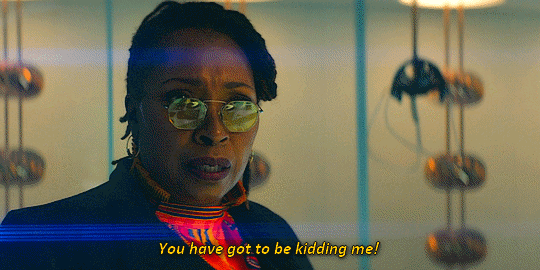
7 years on, this progressive irony has yet to be addressed by the greater fandom. I’m not asking for Doctor Who to treat every marginalised group as a list to tick off and I don’t expect it to perfectly represent my experiences to the letter, but I do expect an allegedly progressive show and fandom to practice what they preach at the absolute bare minimum. If white marginalised genders can recognise how the companion role, despite growing to become more fulfilling and meaningful, is still the side character to a role historically played by a cishet white man, and that playing the lead themselves is, essentially, the greatest form of representation to have in the show… it begs three questions:
1. Why are Black fans then expected to settle for that ‘lesser’ companion role?
2. Why do we not deserve to have the ‘greatest form’ of representation as the lead?
3. Why is casting a Black man as the lead in a show that has only had three Black male leads, two Black male companions and only one that travelled full-time a step back, but a white woman in a show where most female leads are white women already a step forward?
Even when we finally got our ‘POC Doctor’ by Jo Martin, she was another side character. Fugitive’s role was to add to the Timeless Child Mystery and once that was completed, she was a get-out-jail-free hologram in the last series of the Whittaker era. Our first form of Black representation as the lead was still a supporting role. Women of colour in the fandom, Black women especially, had to wait our turn yet again. Ncuti Gatwa is a man and I am not, so I know there are limits on the extent I’ll relate to Fifteen in the same way there were limits for Thirteen. But looking at representation statistically, Black men in Doctor Who are not outnumbering white women, so this idea of a ‘stepback’ is just disingenuous and incredibly antiblack. Many fans shared their ideal doctor castings for after Gatwa and even in place of him. Minus the occasional Lydia West and T’Nia Miller cosign, most of these castings were white women; Olivia Coleman, Gillian Anderson, Tilda Swinton, Phoebe-Waller Bridge etc. Apart from the need to replace our first Black male doctor before his era even began being wild in itself, I thought about who is the idea of female representation in Doctor Who. Gatwa is dark-skinned, but the ‘replacements’ minus T’Nia Miller were not. I want to believe the ‘but he’s a man’ backlash and ‘oh but we only meant white men!’ rebuttals came from a genuine place of hurt from certain parts of Thirteen’s stanbase. However, the continued dismissal of Black fans of all genders who rightfully critique Chibnall’s neglect of the Fugitive, the surprise that conservative white men still rejected Ncuti Gatwa ‘even though he’s a man’ when manhood has never saved Black men from antiblack racism and the treatment of the show’s first Black female companion, Martha Jones, that is still yet to be addressed by allegedly misogyny-concerned fans has me very, very pessimistic. If Ncuti Gatwa was a woman would this response be different? Only time will tell and if we get a dark-skin Black woman in the main lineup one day, we’ll see if this support comes through for real. I’m going to wait and see what Fifteen can provide for the show and wait for my ‘perfect fit’ casting to arrive just as other fans who are Black women have done since day. I hope that white marginalised genders waiting with us ask not why they have to wait, but why is this the first time that they have ever had to.
<- Chapter 1
Chapter 3 ->
#white feminism#strong female characters#fugitive doctor#the fugitive doctor#female representation#fifteenth doctor#ncuti gatwa#doctor who#nuwho#new who#black representation#doctor who analysis#fandom analysis#doctor who fandom#fandom antiblackness#fandom racism#fandom history
16 notes
·
View notes
Text
some taiviet toxic codependent yuri thoughts, because they deserve angst and complexity as much as other pairings. fair warning that these hcs aren’t fluffy and lean more towards a unhealthy relationship interpretation.
- both are able to relate and understand each other from similar trauma and experiences from being under the rule of other countries for centuries
- both faced misogyny as women, they’re able to bond over having to be resilient as female nations
- both have some sort of facade that they won’t even drop around eachother, taiwan has a lot of repressed anger and is temperamental but keeps up the cute girl persona. same for vietnam, who constantly needs to stay stoic and unmoved to hide her vulnerabilities
- communication becomes a huge issue, since neither of them want to show their real feelings, which leads to misunderstandings and assumptions about one another
- taiwan sees vietnam as a protector, and vietnam plays into the protector role because she likes the sense of control. but as a consequence, vietnam is always expected to be the strong one and isn’t the one who is given care and allowed to be emotionally vulnerable
- they both have inferiority complexes related to their womanhood, taiwan wishes to be taken more seriously and not just be seen as a cutesy bubbly girl, yet she’s too scared to leave the comfort of it. vietnam wishes to be cared for and to be emotionally vulnerable, but it’s easier to be closed off and not risk being hurt. these insecurities play off each other
- vietnam kinda has a bit of toxic masculinity? she tries to take on the role of the “man” in the relationship which goes horribly because heteronormative relationship dynamics aren’t healthy. she feels ashamed to seem weak in front of taiwan when taiwan admires her strength so much
- taiwan struggles with codependency when it comes to vietnam, she gets scared she isn’t good enough for her and gets jealous and sometimes even possessive over her.
i kinda wanted to subvert the fanon depiction of them? they both are forced into one dimensional archetypes before being paired together, i wanted to play with the idea of these tropes causing issues in their relationship.
another note, vietnamese people and seasians are still treated poorly in taiwan, which i kinda wanted to reflect that nuance into how i view their relationship. please be cautious of the racial dynamic and the possible implications when you portray them as the popular fanon version or even mine.
29 notes
·
View notes
Text
The Magic of Sisterhood: Panel Presentation
Gliding on the coattails of Buffy, Charmed (1998-2006) follows the lives of three sister witches, navigating their newfound powers and defeating evil from the other side, all while balancing their delicate bonds with one another.

Tensions between the Halliwell sisters are high at the outset of the series, when Prue (Shannon Doughtery) and Piper’s (Holly Marie Combs) youngest sister Phoebe (Alyssa Milano) returns to their inherited home in San Francisco after a long time away. The sisters fill the archetypes of their ages. Prue, the eldest, is responsible and uptight. Piper the middle child is a fantastic mediator in clashes involving little Phoebe’s free-spirited, naive and reckless tendencies.
The main point of the series is the ever-deepening bond between the sisters (“The power of three will set us free!” S1:E1.). The sisters act as mirrors to one another and ultimately they all provide council to one another in differing but all-important ways.
Katherine Whitehurst wrote the piece “Growing Up in Magical Time” dissecting the female development in the magical fantasy world of the ABC series Once Upon a Time (2011-2016), specifically discussing “what ‘ideal’ female development looks like, framing the ideal female as self-sacrificial and benevolent” (11) and the show’s complex structure that includes both episodic and non chronological storytelling which assists in the complex development of female characters.
As a product of the 1990s, Charmed is not, so far as I’ve seen it, super complex or boundary-breaking when it comes to female character development or any other issue for that matter; it’s a fairly white-bread fantasy romance comedy show, starring three attractive white women, who date a rotating cast of square-faced men, as they fight evil beings and then go home after the battle to their impossibly whimsical three-story manor in San Francisco.
That being said, there is some interesting character development and relationship dynamism at play in the series. Whitehurst’s point about the effects of ‘magical time’ in Once Upon a Time, where happenings in the magic realm lead to unpredictable, nonlinear change for the characters, applies to Charmed as well.
The Halliwell Sisters’ change into witches marks a transition into magical time where their characters and relationships develop rapidly. They are given emotional depth because they’re grieving the recent death of their mother. The introduction of magic intensifies their lives.
The Halliwell Sisters have it all AND THEN SOME… They are magical witches, specifically “the most powerful good witches of all time,” which seems like a big thing to just… Become.
Appropriately, all the sisters struggle with some form of imposter syndrome, though they don’t suffer equally. By the 2nd episode, Prue, the eldest, has implored Phoebe, the youngest, to not use her powers under any circumstances (even though none of them can control it).
In the 2nd episode, Prue has a fun night with square-faced man and afterwards her sisters slut-shame her (in an "empowering" way?), suggesting judgement about ideal female sexuality and what's socially acceptable for Prue, a well-to-do white lady in the 90s.
Not only does this scene reveal some of the values of the time concerning women and casual dating, but it also shows the tension that surrounds the sisters’ newfound powers. Here, their powers divide them. They can’t even agree on how to talk about it. They’re judgemental towards one another about their magic and their sex lives; typical catty ladies, amIRight?
By the end of the episode, however, Piper and Phoebe strike a different tone. Phoebe, generally the naive one, offers some sound and comforting advice to her older sister, who is struggling with the transition into being a witch. It’s kind of like the Halliwell sisters enter a sort of puberty all at the same time, which is different then the way they would have experienced such a profound change in their human lives, as they all occupy different ages, and therefore different roles.
youtube
To Whitehurst’s point that the flashback structure of Once Upon a Time shows “how the past and present resonate in unison when considered beyond a linear and ordered temporality” (9), despite Charmed being entirely episodic and mostly chronological thus far (not including the premonitions experienced by Phoebe), the text develops a language of nonlinear development by having the sisters operate as a system, whose different parts and actions influence each other in nuanced ways. The sisters experience growth together that they wouldn’t be able to separately. It is also explained that their powers continue to grow and change. For eight seasons!
CRITICAL THINKING QUESTIONS:
What does a piece’s character development writ large say about the message of a text? Are there good and bad kinds of development? Does a narrative benefit from development in one direction or another, or is a balance necessary?
What does the protagonists’ positionality as privileged women contribute to their character development? Does their privileged status have a connection to the assertion that they are “good” witches?
Charmed doesn’t do very much in the way of challenging the status quo. What components of the show do you think would be different if it was interested in exploring an ideology different from the dominant white and western perspective it represents?
--Melissa (aimlessgeology)
@theuncannyprofessoro
18 notes
·
View notes
Note
I don't go here, but I really dislike how ubiquitous the notion has become in fandom that 'strong and independent woman' is somehow mutually exclusive with 'woman in a romantic relationship/prioritizing romance'. I feel like that's the kind of attitude that leads to terrible readings like 'The Little Mermaid is anti-feminist because Ariel gives up her voice for a man' which requires ignoring several key aspects of the film's plot and Ariel's character specifically (such as the fact that she sings Part of Your World before she ever lays eyes on Eric, and she spent her entire life collecting artifacts from the surface world and arranging them in her grotto), nevermind the fact that a story where someone falls in love and values that highly enough to make significant changes to her life to fight for it would still have value! Because love has value!
Like you said, just because there are a lot of cases where female characters are reduced to love interests and nothing else doesn't mean a female character caring about love and being motivated by love means she can't also be strong and independent. I feel like a lot of people just swing the pendulum way too far in the other direction and seem to think that being in love is what devalued those female characters, and not the fact that they were (by and large) written to be accessories for the male characters they were attached to and had nothing else to contribute to the story.
That is the problem, not romantic storylines themselves.
Precisely, anon! I'm really glad you brought up The Little Mermaid, both because the latest adaptation showcases how important intersectionality is (a black mermaid getting the "generic" love story is not the same thing as another white mermaid getting it) and because I've had similar gripes about many fans' readings of Cinderella. To be clear, I think the Disney + princess craze is a complicated subject with an equally complicated impact on kids, but a lot of people will attempt to simplify that conversation down to, "It's bad because she wants a man." Putting aside that this is not, as discussed, inherently a bad thing... did we miss the part where she's in a clearly abusive household, wants only to experience one fun night, and happens to meet the Prince without ever actively aiming for that to happen? This is a debate my friend and I have had for years, to the point where "Cinderella" is a bit of a code-word for, "We're never going to agree on this topic and others are getting annoyed at our impassioned arguments, so can we just move on now?" lol
I experienced similar frustration back when Jupiter Ascending came out and -- putting aside the quality of the film (or supposed lack thereof) -- people were up in arms about how terrible it is that the woman lead needs to be rescued by the guy, with the reason for that terribleness boiling down to, presumably, the idea that a woman is automatically weak if she needs help. Meanwhile, I was reading things through the lens of the show's realism (of course the average cleaning lady is not going to be able to fight off alien kidnappers without assistance) as well as the joy of seeing parts of myself in a Sci-Fi/Fantasy story. I'm not physically strong. I'm not a martial artist. I'm not someone who's going to immediately come up with a cutting remark and satisfyingly punch someone in the face. As cool as that archetype is, it's reductive to present a Strong and Independent Woman as solely physically strong and romantically independent. That definition should -- and does -- mean a thousand different things!
I do get it. I often have a knee-jerk reaction to certain writing choices for women (there was a maybe baby plot-line for one of Ted Lasso's characters this season that, far more than Keeley, I've been side-eying), but overall I try to approach each story as the individual text that it is. Yes, there are issues with these trends across media... but is this story actually falling into those stereotypes and harmful depictions, or have we just trained ourselves to reject anything in this category by default?
37 notes
·
View notes